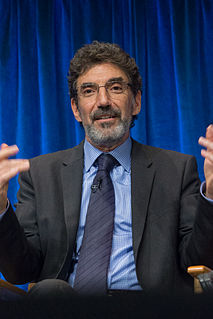A Quote by Henry David Thoreau
A person who chooses to die or to risk death demonstrates that there are values, principles, maxims, that are more valuable to him than is life itself. In short, he places his immortal self above his mortal self. Nothing goes by luck in composition. It allows of no tricks. The best you can write will be the best you are.
Related Quotes
Dostoevsky wrote fiction about identity, moral value, death, will, sexual vs. spiritual love, greed, freedom, obsession, reason, faith, suicide. And he did it without ever reducing his characters to mouthpieces or his books to tracts. His concern was always what it is to be a human being—that is, how to be an actual *person*, someone whose life is informed by values and principles, instead of just an especially shrewd kind of self-preserving animal.
The great characteristic of men of active genius is a sublime self-confidence, springing not from self-conceit, but from an intense identification of the man with his object, which lifts him altogether above the fear of danger and death, which gives to his enterprise a character of insanity to the common eye, and which communicates an almost superhuman audacity to his will.
Strauss admits to being obsessed by his mother's rejection, and with the resultant rents in self-esteem. The Game echoes with disturbingly abusive comments leveled at his adolescent self, a self he feels was unacceptable. With bravado, he expresses regret that he didn't rack up more sexual conquests in his teens; in person, he expresses a truer regret that he was intimidated by life itself.
It is man's intrinsic and irreducible self-responsibility to humanize himself, to exercise his entire range of rational and moral resources to raise his mode of being and seeing and acting above not just that of animals, but also above that of the majority of subhuman (never to be self-realized) humans who will never draw themselves into a self-punishing position of focal self-diagnosis and self-accountability.
A person who makes full use of and exploits his talents, potentialities, and capacities. Such a person seems to be fulfilling himself and doing the best he is capable of doing. The self-actualized person must find in his life those qualities that make his living rich and rewarding. He must find meaningfulness, self-sufficiency, effortlessness, playfulness, richness, simplicity, completion, necessity, perfection, individuality, beauty, and truth.
Therefore the good man ought to be a lover of self, since he will then both benefit himself by acting nobly and aid his fellows; but the bad man ought not to be a lover of self, since he will follow his base passions, and so injure both himself and his neighbors. With the bad man therefore, what he does is not in accord with what he ought to do, but the good man does what he ought, since intelligence always chooses for itself that which is best, and the good man obeys his intelligence.
The young man who addresses himself in stern earnest to organizing his life-his habits, his associations, his reading, his study, his work-stands far more chance of rising to a position affording him opportunity to exercise his organizing abilities than the fellow who dawdles along without chart or compass, without plan or purpose, without self-improvement and self-discipline.
Self-discipline is the key to personal greatness. It is the magic quality that opens all doors for you, and makes everything else possible. With self-discipline, the average person can rise as far and as fast as his talents and intelligence can take him. But without self-discipline, a person with every blessing of background, education and opportunity will seldom rise above mediocrity.
The faithful man perceives nothing less than opportunity in difficulties. Flowing through his spine, faith and courage work together: Such a man does not fear losing his life, thus he will risk losing it at times in order to empower it. By this he actually values his life more than the man who fears losing his life. It is much like leaping from a window in order to avoid a fire yet in that most crucial moment knowing that God will appear to catch you.
I'm thinking of writing a children's story about a leaf on a tree who arrogantly insists he's a self-made, independent leaf. Then one day a fierce wind blows him off his branch and to the ground below. As his life slowly ebbs away, he looks up at the magnificent old tree that had been his home and realizes that he had never been on his own. His entire life he had been part of something bigger and more beautiful than anything he could have imagined. In a blinding flash, he awakens from the delusion of self. Then an arrogant, self-centered kid rakes him up and bags him.
It hath been said, that there is of nothing so much in hell as of self-will. The which is true, for there is nothing else there than self-will, and if there were no self-will, there would be no Devil and no hell. When it is said that Lucifer fell from Heaven, and turned away from God and the like, it meaneth nothing else than that he would have his own will, and would not be at one with the Eternal Will. So was it likewise with Adam in Paradise. And when we say Self-will, we mean, to will otherwise than as the One and Eternal Will of God willeth.
There must be only three supreme values which govern a person's life: Reason, Purpose, and Self-esteem. Reason, as his only tool of knowledge--Purpose, as his choice of the happiness which that tool must proceed to achieve--Self-esteem, as his inviolate certainty that his mind is competent to think and his person is worthy of happiness, which means: is worthy of living. These three values imply and require all of man's virtues, and all his virtues pertain to the relation of existence and consciousness: rationality, independence, integrity, honesty, justice, productiveness, pride.

































